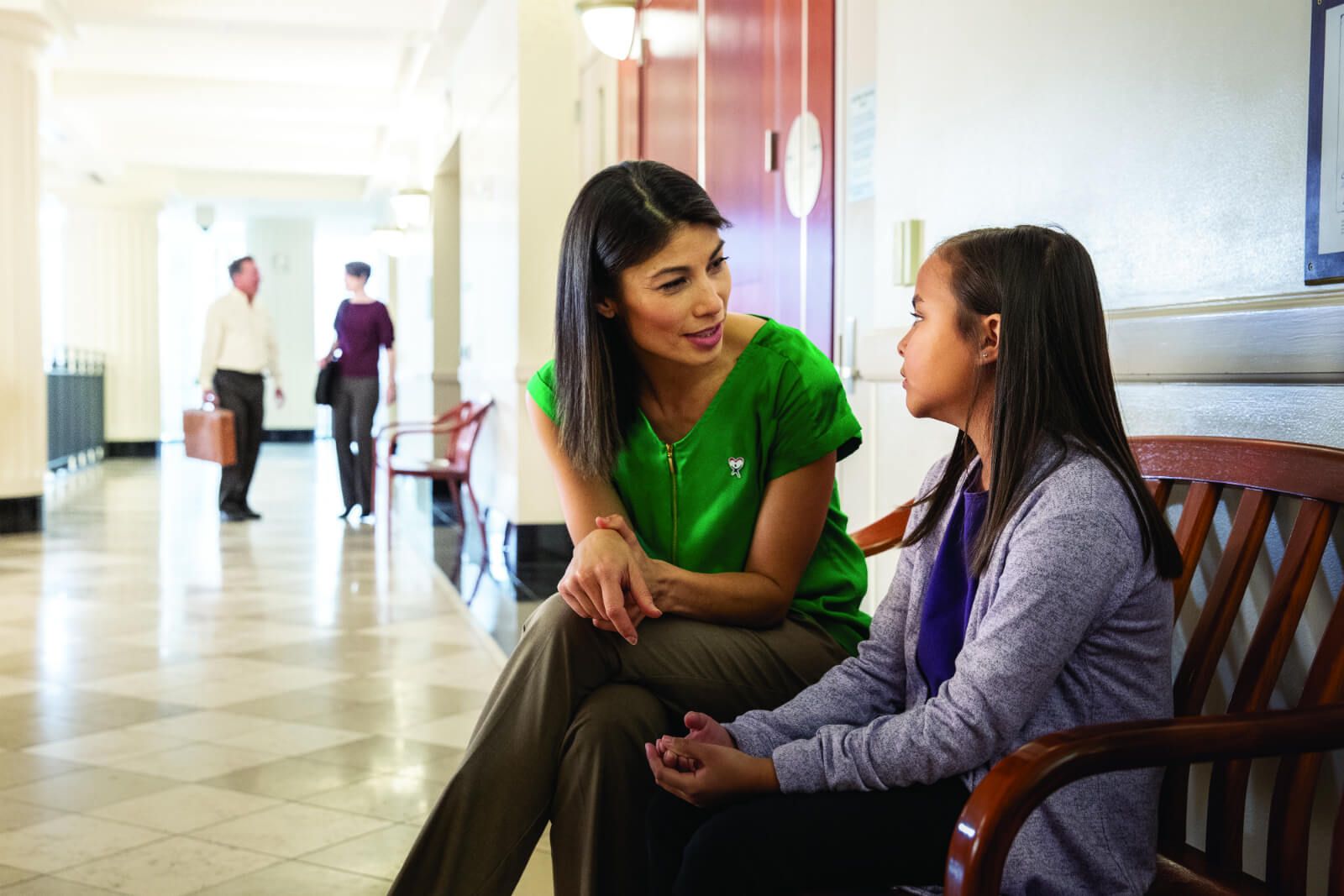- What is a CASA?
- What is the role of the CASA/GAL?
- How does a CASA investigate a case?
- How does a CASA differ from a Children Service’s caseworker?
- How does the role of a CASA differ from an attorney?
- Is there a “typical” CASA?
- Can anyone be a CASA?
- How many cases on the average does a CASA carry at a time?
- What training does a CASA receive?
- How does the CASA relate to the child he/she represents?
- How much time does it require?
- How long does a CASA remain with a case?
- Are there any other agencies or groups that provide the same service?
- What children are assigned a CASA?
- How did the CASA program get started?
- How many CASA programs are there?
- How effective have CASA programs been?
- Do lawyers, judges and social service caseworkers support CASA?
- Does the federal government support CASA?
- What is the role of the National CASA Association?
-
What is a CASA?
A Court Appointed Special Advocate (CASA) is appointed by a judge to represent the best interests of an abused or neglected child in court.
-
What is the role of the CASA/GAL?
A CASA provides a judge with a carefully researched background of the child to help the court make sound decisions about the child’s future. Each case is as unique as the child or children involved. The CASA must ultimately determine if it is in a child’s best interest to stay with his or her parents or guardians, be placed in foster or relative care, or be freed for permanent adoption. The CASA makes a recommendation on placement and services to the judge and continues on the case until the child is placed in a safe, permanent home.
-
How does a CASA investigate a case?
To prepare a recommendation, the CASA talks with the child, parents, family members, social workers, school officials, health providers, and others who are knowledgeable about the child’s history. CASA also utilizes their court order to collect records from various sources to review prior to making recommendations.
-
How does a CASA differ from a Children Service’s caseworker?
Social workers may work on as many as 25-33 cases at a time, which can limit the amount of time available for a comprehensive investigation of each. The CASA is a volunteer who handles only one or two cases at a time. As an independent appointee of the court and a party to the case, the CASA thoroughly examines a child’s case, has knowledge of community resources, and is required to make recommendations to the court based on the best interests of the child. Unlike the caseworker, who has a legal mandate to try to reunify families, the CASA’s mandate is to advocate for the best interests of the child. A trained CASA and a skilled caseworker are both critical to a successful case.
-
How does the role of a CASA differ from an attorney?
The CASA does not provide legal representation; that is the role of the attorney. Instead, the CASA volunteer advocates for the best interests of the child. The CASA provides crucial background information and logical, fact-based recommendations that assist the court in making sound decisions for the child.
-
Is there a “typical” CASA?
CASAs come from all walks of life, with a variety of professional, educational and ethnic backgrounds. Diversity is valued and provides a foundation of strength to our program. The CASA of Northeast Ky program is composed of both male and female volunteers over 21 years of age who may be: employed full-time or part-time; be retired; volunteer attorneys; or homemakers.
-
Can anyone be a CASA?
CASAs are ordinary citizens, twenty-one years of age or older. No special or legal background is required. However, volunteers are screened closely for objectivity, competence and commitment.
-
How many cases on the average does a CASA carry at a time?
The number varies, but on the average each CASA carries one or two cases at a time. The National CASA Association suggests volunteers carry no more than two cases at any given time.
CASA volunteers are not assigned, but are asked to take a case. CASA volunteers always have the right to turn down a case assignment and appointments are carefully made by CASA staff based on availability, skill, experience and individual preference as to age/gender.
-
What training does a CASA receive?
CASA/GAL trainees undergo a thorough one-time, 33-hour training. Volunteers learn about courtroom procedure from the principals in the system: judges, lawyers, service providers, caseworkers, court personnel and others. CASA trainees also learn effective advocacy techniques and are educated about specific topics ranging from child sexual abuse to early childhood development and adolescent behavior. Cultural awareness and sensitivity are also part of the training curriculum. The culmination of the initial training is the swearing-in ceremony with the Juvenile Court Judges where CASA/GAL volunteers become sworn officers of the Court.
Following the initial training, CASAs are required to complete 12 hours of In-Service a year to remain active with cases
-
How does the CASA relate to the child he/she represents?
The CASA interviews the child he/she represents, if the child is old enough to talk. If not, the CASA observes the child’s interactions with the various people involved in the child’s life. The CASA offers the child a trust-based relationship and advocacy, both within and outside the courtroom, during complex legal proceedings. The CASA explains to the child the events that are happening and the roles the judge, lawyers, social workers and others play. The CASA also encourages the child to express his or her own opinions, fears, and hopes and conveys those to the court. The CASA attends all case reviews, case planning conferences, school meetings, and gathers all relevant records relevant to the child. The CASA attends all hearings to provide both oral and written reports regarding the status of the parents, progress of the family, updates on the child and recommendations for the Court on behalf of the child. The CASA also ensures that all court orders are followed and reports any and all violations.
-
How much time does it require?
Each case is different. A CASA volunteer usually spends about 10-20 hours doing research and conducting interviews during the first 4-6 weeks of a new case. Once a CASA writes his/her initial report and appears at the first hearing, he/she can expect to work about 1-2 hours per week on a case.
-
How long does a CASA remain with a case?
The CASA continues on the case until the case is permanently resolved. Each volunteer is asked to make an initial one-year commitment to the program. One of the primary benefits of the CASA program is that, unlike other case principals who often rotate cases, the volunteer is a consistent figure in the court proceedings and the child’s life, providing much needed continuity for the system and, more importantly, for the child.
-
Are there any other agencies or groups that provide the same service?
No. There are other child advocacy organizations, but CASA is the only program in which volunteers are appointed as officers of the court by the judge to represent a child’s best interest.
-
What children are assigned a CASA?
Children who are victims of sexual abuse, physical abuse, emotional abuse, or neglect, for whom cases have been file in the Juvenile Court, are assigned a CASA/GAL.
-
How did the CASA program get started?
In 1977 a family Court Judge in Seattle felt he was making life changing decision with very little information due to the overwhelming caseload of state social workers. He decided to train ordinary citizens in confidentiality and juvenile court proceedings and let them be a voice for children.
In 2000, Judge George Davis and Foster Care Review Board Current Chairperson Christy Reaves started the CASA program in Boyd County.
-
How many CASA programs are there?
All 50 states now have CASA programs. Nationwide approximately 70,000 citizens serve as CASA volunteers in over 950 programs. Every year approximately, 280,000 abused and neglected children are served by CASA volunteers.
-
How effective have CASA programs been?
Children with a CASA volunteer are half as likely to spend time in long-term foster care, defined as more than three years in care. Cases involving a CASA volunteer are more likely to be permanently closed. Fewer than 10% of children with a CASA volunteer reenter the foster care system. CASA volunteers spend most of their volunteer time in contact with a child. They generally handle just one or two cases at a time so that they can give each child the sustained, personal attention he or she deserves. To a child, that means a consistent and caring adult presence in his or her life.
-
Do lawyers, judges and social service caseworkers support CASA?
Yes. Juvenile and family court judges implement the CASA program in their courtrooms and appoint the volunteers. CASA has been endorsed by the American Bar Association, the National Council of Juvenile and Family Court Judges, and the National Association of Public Child Welfare Administrators. CASA is a major project of Kappa Alpha Theta Sorority and Kiwanis.
-
Does the federal government support CASA?
Yes. CASA is a priority project of the Department of Justice’s Office of Juvenile Justice and Delinquency Prevention and the State of Ohio Attorney General’s Office. These offices encourage the establishment of new CASA programs, assist established CASA programs, and provide partial funding for the National CASA Association, of which CASA of Northeast Ky, Inc. is an accredited member.
-
What is the role of the National CASA Association?
The National CASA Association is a non-profit organization that represents and serves local CASA programs. It provides training, technical assistance, research, legislative awareness, news and public awareness services to members. The National CASA Association is located in Seattle, Washington, and is funded through a combination of private grants, federal funds, memberships and contributions.

